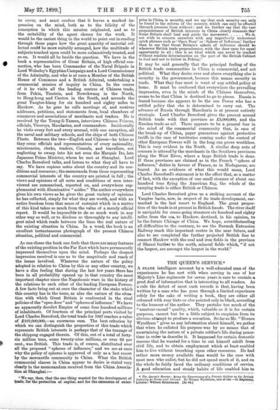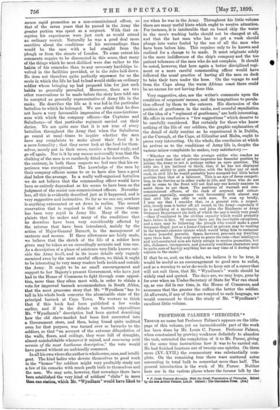THE QUEEN'S SERVICE.* A FRANK intelligent account by a well-educated
man of the experiences he has met with when serving in one of her Majesty's Line regiments for seven years is sure to contain a good deal of information that is interesting to all readers. As a rule the defect of most such records is that, having been written by a man who has gone through a limited experience solely for the sake of writing a book, they are either all coloured with rosy tints or else painted only in black, according to the humour of the author. They partake too much of the " amateur-casual " quality, which, valuable as it is for certain purposes, cannot but be a little subject to suspicion from its obvious attempt to produce a sensation. So far as Mr. "Horace Wyndham" gives us any information about himself, we gather that when he enlisted his purpose was by no means that of ascertaining the nature of a private soldier's life during peace- time in order to describe it. It happened for certain domestic reasons that he wanted for a time to cut himself adrift from civil life, and to obtain employment which at least enabled him to live without trenching upon other resources. He had rather more money available than would be the case with most men who enlist,-but he did not spend much of it and on the whole he fairly faced the ordinary conditions of service. A good education and steady habits of life enabled him to • The Queen's Service : being the Experiences of a Private Soldier in the BrW.li Infantry at Home and Abroad. By Horace Wyndham, late of the —th
London : William Heinemann. Ds. fld.] .
secure rapid promotion as a non-commissioned officer, so that of the seven years that he passed in the Army the greater portion was spent as a sergeant. With that ex- ception his experiences were just such as would attend an ordinary recruit. Naturally he was a good deal more sensitive about the conditions of his surroundings than would be the case with a lad straight from the plough or from the streets of London. To some extent his comments require to be discounted in this sense, that many of the things which he most disliked were due rather to the habits of his comrades than to any necessary hardships in- volved in the facilities provided, or in the rules laid down. He does not therefore quite perfectly represent for us the mode in which the life he had to lead would strike an ordinary soldier whose bringing up had prepared him for just such habits as generally prevailed. Moreover, there are two other reservations to be made before the story here told can be accepted as generally representative of Army life in the ranks. He describes the life as it was led in the particular battalion to which he belonged. We are afraid that he does not leave a very favourable impression of the conscientious- ness with which the company officers—the Captains and Subalterns—of that particular regiment carried out their duties. We are quite sure that it is not true of every battalion throughout the Army that when the Subalterns go round at meal - times to inquire whether the men have any complaints to make about their food it is a mere formality ; that they never look at the food for them- selves, merely put in their noses, receive a formal reply, and go off again. Nor is it by any means universally true that the clothing of the men is so carelessly fitted as he describes. On the contrary, in both these respects we feel sure that his ex- perience was exceptional. The knowledge of the men by their company officers seems to us to have also been a good deal below the average. In a really well-organised battalion we do not believe that the commanding officer would have been so entirely dependent as his seems to have been on the judgment of the senior non-commissioned officers. Neverthe- less, all this is evidently described just as it happened, and is very suggestive and instructive. So far as we can see, nowhere is anything extenuated or set down in malice. The second reservation that is required is that of late years change has been very rapid in Army life. Many of the com- plaints that he makes and many of the conditions that he describes have been very considerably affected by the reforms that have been introduced, mainly by the action of Major-General Burnett, in the management of canteens and messes. If these allowances are fairly made, we believe that the sketch of the life of a soldier here given may be taken as an exceedingly accurate and true one. As a description of a phase of existence very little known out- side the Army itself, and in its inner details only vaguely surmised even by the most careful officers, we think it ought to be interesting to very many readers both inside and outside the Army. It ought to be no small encouragement and support to her Majesty's present Government, who have just had in the House of Commons to fight through some opposi- tion, more than they often meet with, in order to obtain a vote for improved barrack accommodation in South Africa, that the most gruesome story that Mr. "Wyndham "has to tell in his whole book concerns the abominable state of the principal barrack at Cape Town. We venture to think that if this book had been published a few weeks earlier, and if in the debate on barrack expenditure Mr. " Wyndham's" description had been quoted describing how the old slave-market had been first converted into a Government store, and then, being found quite unfitted even for that purpose, was turned over as barracks to the soldiers, so that "on account of the extreme dilapidation of the wall; floors, and ceilings, they were full of draughts, almost uninhabitable whenever it rained, and swarming with vermin of the most loath-some description," the vote would have passed without an unfriendly comment.
In all his own views the author is wholesome, sane, and intelli- gent The kind ladies who devote themselves to good work in the "homes" for soldiers might very profitably study not a few of his remarks with much profit both to themselves and the men. We may note, however, that nowadays there have been established the very kind of soldiers' "clubs" in more than one station, which Mr. "Wyndham" would have liked to see when he was in the Army. Throughout his little volume there are many useful hints which ought to receive attention. For instance, it is intolerable that on board ship the water in the men's washing baths should not be changed at all, and that the last man who has to get a wash should plunge into water fouled by the use of all the men who have been before him. This requires only to be known and realised for a change to be made. It must originate solely in the mere indifference of the ship's company and the too patient tolerance of the men who do not complain. It should be noted, however, that here again a better disciplined regi- ment or a more careful commanding officer would have followed the usual practice of having all the men on deck to take their turn under the hose. On the voyage to and from the Cape along the warm African coast there could be no excuse for not having done this.
Very suggestive, also, are the writer's comments upon the condition of sergeants' messes, and the temptations to pecula- tion offered by them to the caterers. His discussion of the position of gentlemen in the ranks, and scornful repudiation of the idea of a "regiment of gentlemen," are both interesting. He offers in conclusion a "few suggestions " which deserve to be carefully considered. But certainly for those who know nothing of the life of our soldiers, the graphic explanation of the detail of daily routine as he experienced it in Dublin, at the Curragh, at the Cape, at Gibraltar and Malta., ought to prove very interesting. On the whole, the conclusion at which he arrives as to the conditions of Army life is, despite the various minor complaints he makes, very satisfactory :— " Whether on the whole the average soldier who reaches no higher rank than that of private improves his financial position by joining the Army or not is perhaps rather an open question. The odds are, I am inclined to think, that, if he has not displayed sufficient ability to gain promotion, with the higher pay of such rank, in civil life he would probably have occupied but little better position than that of a labourer. This is an age of fierce competi- tion, in the Service as in other walks in life, and those who do not seek to come to the front will not find any one keenly anxious to assist them to get there. The positions of warrant and non- commissioned officers, of the rank of sergeant and colour- sergeant especially, compare very favourably with almost any that civil life can offer to such men. To sum up briefly, I may say that I consider that, es a general rule, a respect- able, steady man is better off, all round, in the Army—especially if he is anything of a mechanic, and joins the Engineers or Army Ordnance Department (in both of which the pay is really very good) —than if employed in the civilian capacity which would probably have fallen to him. Of course there are the inevitable exceptions, and a man may be following the plough who would make a good Sergeant-Major, just as a Lance-Corporal or private may be wasting in the bayonet-exercise talents which would bring him to eminence in more peaceful pursuits. Space, however, prevents my dwelling upon them here. They only serve to prove the rule—that intelligent and well-conducted men are fairly certain to receive promotion, but idle, dishonest, intemperate, and generally worthless characters may be quite sure of having anything but an easy time of it during their sojourn in the ranks."
If that be so, and, on the whole, we believe it to be true, it would be useful as an encouragement to good men to enlist, and as a warning to ne'er -do-weels to keep out of a career that will not suit them, that Mr. " Wyndham's " words should be widely read and quoted. The days are, we may hope, gone by for ever when an Under-Secretary of State for War can stand up, as one did in our time, in the House of Commons, and announce that the greater the ruffian the better the soldier. At all events, if any of them are tempted to such language, we would commend to them the study of Mr. " Wyndham's " excellent little volume.







































 Previous page
Previous page